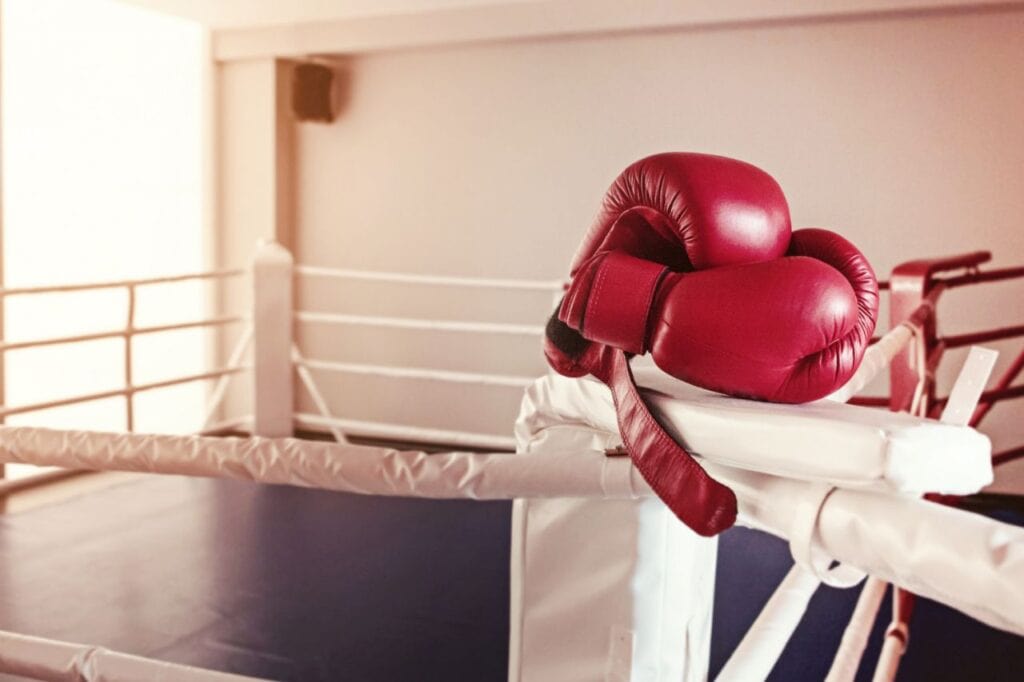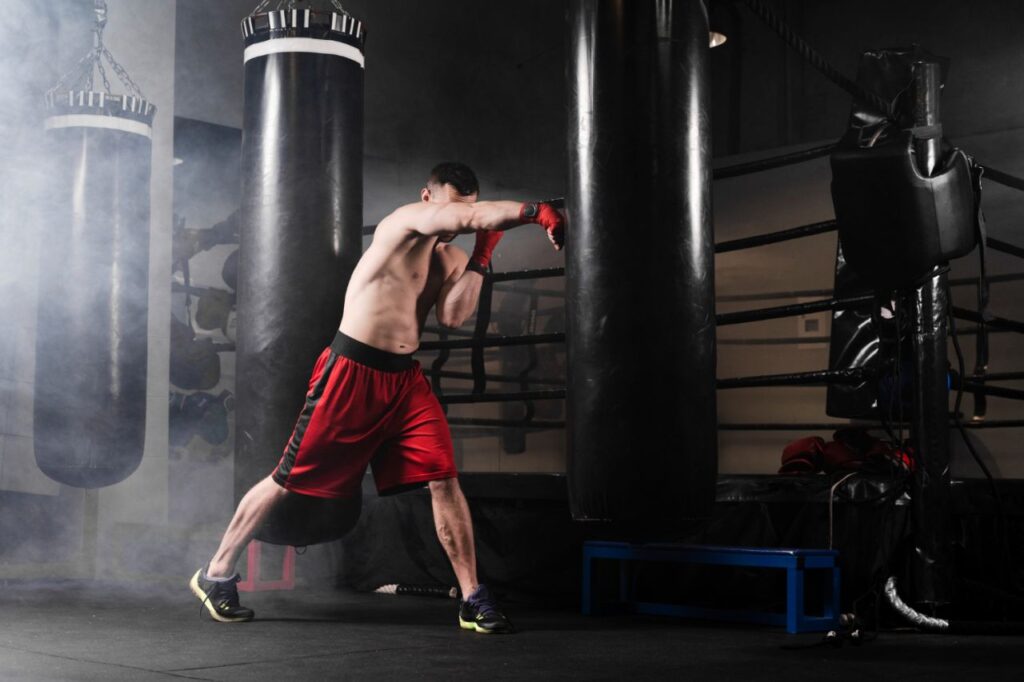All great champions have felt this feeling at some point: the fear of getting hit. Technique, targeted training, and self-confidence are key elements for improving and avoiding getting hit as much as possible.
While you don’t have to participate in fighting or live sparring to enjoy staying in shape with fitness boxing, doing so may be way more fun than you realise. It is, after all, the sport of pugilism, so why not give some ring time a try?
During every fighter’s career, they have had to deal with fear. Whether or not they will admit it, even the most intimidating and ferocious competitor has had to fight, forget, flee from or face their fear in the ring.
The impact of fear on performance and the role it plays in the sport is something that cannot be denied.
It has kept contenders from winning championships and has prevented bright prospects from realising their potential. Fear can’t be suppressed or wished away but rather embraced to harness its power and purpose.
And part of harnessing that power is understanding it.
In many ways, it matters not what we fear or why we fear it. What matters is how we deal with and respond to fear. It matters that we maintain a level of fear that, in conventional terms, is sensible.
After all, it’s not every day that you take on an opponent who has trained very hard to knock you out cold. A fight is quite a serious event. Likewise, a boxer doesn’t take up the sport to consistently experience the feeling of losing.
It is perfectly normal to fear losing, just as it is perfectly normal to fear having the crap beaten out of you.
However, facing a live opponent is getting hit, and nobody boxes without taking some punches. So naturally, you’re probably worried about this, which makes sense--getting hit isn’t exactly a smooch on the cheek from your favourite aunt!
The punching will hurt you. The intensity can differ, but the result will be hurtful most of the time.
You can be prepared if you can see the punch, but if you cannot, your situation can make you panic and lose confidence in your performance.
But, your fear can be overcome so that you can comfortably get into the ring and find out just how enjoyable and competitive the sport of boxing can be.
Understanding Your Fear Of Getting Hit In Boxing
Fear is part and parcel of life, whether we like it or not. We can go a step further and say that life depends upon fear. Without fear, our ancestors would have never survived long enough to procreate.
Rather than fear your average sabre-toothed tiger and therefore treat it with the kind of caution that prudence would dictate, our ancestors would have wandered up to such a beast and been promptly eaten.
Getting punched is not a good feeling. Punches hurt! It’s not ice cream, and it’s not a back massage. It’s not a birthday present. It’s painful! You’re not supposed to like it, okay?
So right off the bat, if you’re getting hit by punches that are too hard and too painful, you will be afraid. There’s no way to get around that. Whatever hurts you will scare you. Whatever might hurt you will scare you.
Secondly, there’s a good chance you do not see the punches. Imagine hearing a scary sound around the corner, but you can’t see what it is. It’s creepy as hell! Imagine trying to fight with your eyes closed.
When you don’t know what to expect, that ambiguity can wreak havoc on your confidence. The intensity can differ, but the result will be hurtful most of the time.
You can be prepared if you can see the punch, but if you cannot, your situation can make you panic and lose confidence in your performance.
Fighters all deal with these feelings of fear in different ways. Some listen to music to take their mind off the anxiety; others surround themselves with friends or peers to serve as a distraction.
Some fighters might even talk themselves up in an attempt to project confidence instead of feeling stress, while others might quarantine themselves in seclusion, where they can quietly deal with their fear on their own.
None of these methods or tricks is particularly right or wrong, and they are just methods to cope.
The important thing is recognising fear for what it is fully, embracing it, and feeding it. When it comes down to fight time, don’t try to suppress it and bottle it up. Use it! Let your mind fire on all cylinders.

Feed the adrenaline monster. Enjoy the fact that your body is fully preparing you. You can even let the fact that these feelings make you uncomfortable make you mad.
Overcoming Fear Of Getting Hit
First, before preparing to take a punch, you need to have the basics of giving a punch mastered. It would help if you also understood the footwork, defensive moves, and rules of boxing.
Your trainer can help you with this since part of being a good trainer involves understanding when it is safe for a pupil to move on to the next level.
Once you are at this stage, you can begin preparing for taking one in the kisser—which, by the way, isn’t nearly as bad as it sounds.
The first rule to remember is: Don’t jump into the ring with anyone bigger or more experienced than you are, since nothing will turn you off to the sport more quickly than being punched in a one-sided fight.
Again, your trainer will help with this, and even your boxing opponent will want. Most of us desire a good, fair fight or sparring session. Nobody benefits from one participant unfairly beating the snot out of the other, including the one with the unfair advantage.
Stay within your weight class and skill level, and you will be fine.
Next, there are drills that you can do which will help you become accustomed to taking a punch that, despite the initial shock, doesn’t hurt as much as you may think.
Once you are in the ring and taking part in full contact sparring and fighting, it will just be part of what you are doing--much like how you don’t think about the pain of being hit when playing football or other contact sports.
Here are some drills which will help you jump fearlessly into the ring:
Partner Drills
Getting hands-on experience in live training before you go for sparring can help you overcome your fear. These live drill sessions will allow you to be comfortable while playing with defence, throwing combinations, and getting hit during the same.
The skills are essential to master, and your experience with them can help you with them in actual sparring and with a much better performance.
Slow Boxing
The main advantage of this drill is to get you to see punches rather than being shocked by them. Flow boxing entails getting into the ring with an opponent and doing slow, deliberate, and low-impact sparring.
The object isn’t to land as many punches on your opponent as possible or take all the punches yourself.
Rather, it is to trade slow, ineffective punches on equal terms while practising correct footwork and defensive measures—just no defence at all cost.
Doing this drill will help you relax when punched, rather than cringing against it, which gets you hurt!
Choose a Similar Level Partner
Do not choose a partner that can be harder on you. Never fight with an opponent who is better in speed and strength and owes much experience than you.
To get acquainted with the punching, you should know that with intensive practice and time, your body will be able to hold harder punches without any feeling of pain.
In addition, the natural instantaneous reflexes being developed with time will help you develop quick response action for your opponent.
Play “Flinch”
Okay, so this may not be the same as what you played with your schoolmates, where you receive a sock in the arm if you flinch, though it is similar in concept.
For this drill, you need two people to stand facing each other, with one of them throwing a series of punches within inches of the other’s face without making contact.
The puncher should start slowly and then gradually ramp it up until full punching speed is achieved, and the object is for the receiver to learn not to flinch.
Throw Balls at Each Other
Starting with perhaps a beach ball and working up to a volleyball or light medicine ball, have one participant stand with arms to sides while the other pops them in the face with the ball.
This teaches you to stay calm, not flinch, and get used to being tapped in the face by a gloved fist—which, by the way, won’t be too different from being popped with a light medicine ball or volleyball.
The real problem behind this fear
We truly feel the problem comes from beginners pushing themselves too hard. They have all these unrealistic expectations from watching TV, movies, and Youtube videos that they think they can channel the spirit of Mike Tyson after only a week’s worth of training.
It’s just not possible. Imagine a beginner surfer trying to take on a 16-foot wave on his first day. You can bet he’d be wiped out in no time.
We are not saying that beginners shouldn’t challenge themselves, but it should be done in moderation. Sure, you always have tough guys here and there that are genuinely built with a strong mind and have no fears, and of course, those guys can do it.
But if you’re not like them, then you need to take it slow or else you’ll get hurt—physically and emotionally. And getting destroyed emotionally takes forever to come back from.
Preparation can help with overcoming fear
Boxers combat fear through preparation.
A training camp for a fight is less about developing skills and getting in shape and more about building the confidence and constitution to handle the battle. When a fight camp starts, the fighter already knows how to fight.
At the very least, he won’t get much better at it within a 6 to 8 week period (the typical length of time between signing a fight contract and the date of the fight) before about.
The drilling, sparring, and training during a camp make a fighter the best version of himself he can be. In addition, it allows him to develop the confidence needed to face an opponent trained to hurt him.
Don’t let fear consume you
Cus D’Amato’s protégé, Mike Tyson, struggled with fear throughout his career. He was very open about his feelings of anxiety from his amateur days all the way through to his professional career. His trainers spent hours consoling him and helping him come to terms with his fear.
Tyson even said himself, “I’m scared every time I go into the ring, but it’s how you handle it. What you have to do is plant your feet, bite down on your mouthpiece and say, ‘Let’s go.’”
Without question, Tyson learned how to harness his fear, and it ultimately became one of his most powerful weapons. He entered nearly every bout being the one doing the intimidating and allowed his opponents’ fear to do most of the damage before he even threw the first punch.
Learn how to use fear to your advantage

There is a phenomenon known as the “excitation transfer.” It works like this:
Fear causes an increase in heart rate, blood pressure, and respiration. While these feelings are the markedly unpleasant products of fear, these feelings persist even after you’ve dealt with your fear.
However, the moment you overcome whatever you’re fearful of, you likely experience pleasant feelings of triumph and victory.
Instead of focusing on the fear and anxiety you felt before and during the encounter, you mainly focus on and remember the satisfaction and growth.
This behaviour is automatically present in thrill-seekers, adrenaline junkies, and people who love scary movies.
It’s not that they don’t experience fear like those who enjoy bungee jumping or roller coasters. It’s just that they identify more with the positives surrounding the event—the social bonding or feelings of admiration that comes from onlookers—than the fear itself.
Their fear response is completely different from other people. In other words, they feel fear, but they enjoy it.
Getting beat up does not make you a better fighter
Sure, it might make you tougher. But it also might make you a more psychologically damaged fighter. Your ego can only take so much abuse before your self-esteem is damaged.
I can bet you right now that the most confident fighters you see in the gyms are probably not going to be the most beat-up ones.
Often, the reason why fighters are scared of getting hit is that they’ve subjected themselves to getting hit hard. They’ve somehow made up in their mind that they need to get hit hard to learn how to fight.
Finally
Yes, there are other means to getting you used to be hit, although these simple drills should fit the bill nicely. The main thing is you need to learn to relax, stay calm, and not allow the shock of a tap to the face to make you apprehensive or cringe.
By learning to take a punch, you will not only be safer and less prone to injury, but you will have more fun and be more competitive as well.
We may have evolved as people, but those same basic instincts that kept the man alive before technology and sophistication took over still dominate human physiology. They are innate in us. Whether we are swinging clubs or throwing punches, survival is still at the core of our existence.
This especially applies to fighters, who seek the experience of going toe-to-toe, exposing themselves or their opponent and squaring off in front of hundreds or even thousands of spectators.
Those that succeed discover that the greatest challenge wasn’t an opponent but their own emotions headlined by fear.
That’s what makes winning that much more powerful because once you’ve conquered your own unbridled emotions, everything else is child’s play with fear, just another toy.
FAQs
Are Boxers Scared To Get Hit?
Short answer: no. When you’re boxing, you expect to be hit. Therefore every time a punch comes at you, your brain knows it’s coming, so you tense slightly to be able to take the shot. We don’t feel the punches that come our way most of the time, so there’s no need to fear them.
Why Am I Scared To Get Hit In A Boxing Match?
Often, the reason why fighters are scared of getting hit is that they’ve subjected themselves to getting hit hard. They’ve somehow made up in their mind that they need to get hit hard to learn how to fight.
How Do I Get Rid Of My Fear Of Boxing?
How to overcome fear: 7 lessons from boxing on facing fears, phobias, and anxieties
- Understand what you’re really afraid of.
- Facing fear is easier than ignoring it.
- Prepare to face your fears.
- Learn to use fear to your advantage.
- Be mindful of your fears.
- Become familiar with your fears.
- Take action in the face of your fears.
Does Boxing Help With Fear?
Boxing is good for anxiety to release tension & negative emotion. The fast-paced dynamics of kickboxing drive the body through variations of punching and kicking strikes – this physically relieves the tension in your body that can accumulate due to stress.
How Can Boxers Take So Many Hits?
Speaking from 10 years of experience. There are many different reasons why boxers and MMA fighters can take hits so well. Conditioning: Most people who commit to becoming a fighter train constantly. A fighter will have like 2-3 times more cardio compared to the average person.
- Find a gym. Boxing gyms aren't typically found in the yellow pages, but there are resources on the internet that can lead you in the right direction. ...
- Be sure the gym is within striking distance. ...
- Be open-minded. ...
- Choose your coach carefully. ...
- Do judge the gym by its cover.
So, can boxing be self-taught? Boxing can be self-taught but it's not the quickest and most effective way to become better at the sport because you aren't able to tap into the knowledge of a boxing coach who would be able to help you one to one.
Best Age to Start
Specialists in sports medicine believe that boxing classes are better to start from 9-10 years. Starting too early could result in putting the student off, as boxing is hard work and not always as fun as team sports, such as football or rugby.

